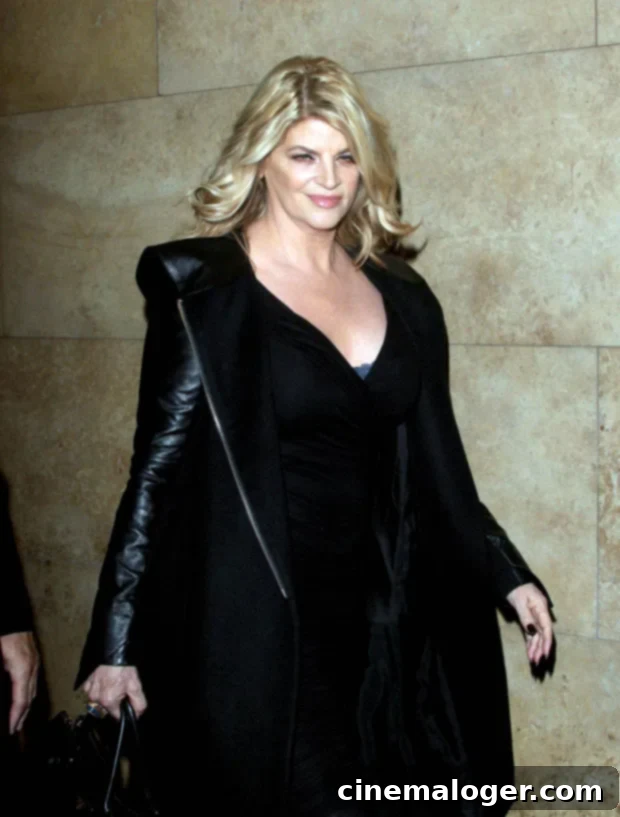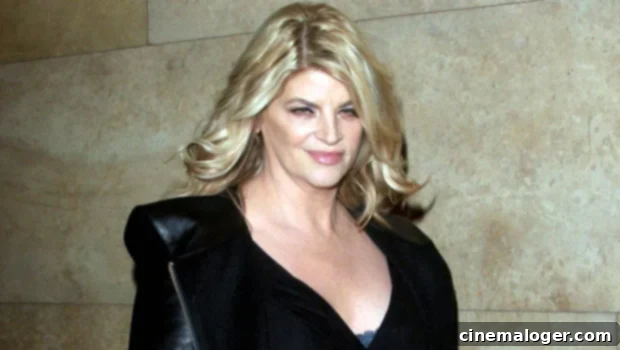Kirstie Alley’s Donald Trump Endorsement Sparks Heated Debate and Celebrity Backlash on Twitter
Renowned actress Kirstie Alley ignited a significant firestorm across social media platforms after publicly declaring her support for then-President Donald Trump in the upcoming election. Her candid revelation, shared via Twitter, immediately prompted a cascade of reactions, ranging from staunch support to fierce criticism, echoing the deep political divides prevalent in society.
The Cheers and Look Who’s Talking star, who rose to prominence in the 1980s, has been a long-standing supporter of the Republican candidate. However, her tweet on October 17, 2020, specifically articulating her reasons for voting for Trump, captured widespread attention and rapidly made her name a top trending topic globally. Alley, then 69, stated unequivocally: “I’m voting for @realDonaldTrump because he’s NOT a politician. I voted for him four years ago for this reason and shall vote for him again for this reason.”
The Rationale Behind Alley’s Endorsement
Kirstie Alley elaborated on her decision, outlining a belief in Trump’s ability to drive change and economic recovery outside the conventional political framework. She continued her thread by adding, “He gets things done quickly and he will turn the economy around quickly. There you have it, folks, there you have it.” This statement underscored her perspective that Trump’s non-traditional political background was an asset, allowing him to operate with greater efficiency and achieve tangible results, particularly in economic sectors.
Her endorsement was rooted in a narrative often echoed by Trump’s supporters: the appeal of an outsider who bypasses political norms and bureaucratic hurdles. This sentiment resonates with those disillusioned by career politicians and the perceived sluggishness of conventional governance. For Alley, Trump represented a departure from the status quo, promising swift action and decisive leadership, especially in the face of economic challenges.
Immediate Repercussions and Widespread Criticism
The actress’s comments swiftly propelled her into the center of a heated online debate. Her name began trending worldwide within hours, as countless Twitter users weighed in on her political stance. The feedback was largely critical, with many challenging the validity of her arguments and pointing out perceived inconsistencies in her reasoning.
Numerous users contested her claim that Trump “gets things done quickly,” citing various policy initiatives and legislative challenges faced during his tenure. One particularly notable response highlighted a change of heart: “But he hasn’t gotten anything done. I voted for him four years ago too and realized my mistake and voted for Joe Biden. We can dialogue respectfully if you like and I won’t force your vote but just hope you think about it.” This comment reflected a segment of the electorate that had re-evaluated their initial support for Trump, emphasizing the fluidity of political allegiance and the importance of critical reassessment.
The criticism extended beyond policy debates, touching upon broader ethical and societal concerns. Another Twitter user poignantly asked, “How could anyone be so indifferent to the death and suffering Trump has inflicted on the nation?” This question captured the deep emotional and moral anguish felt by many opponents of the administration, illustrating the profound impact of political leadership on public well-being and sentiment. The debate quickly transcended simple policy disagreements, delving into questions of empathy, responsibility, and the ethical implications of political endorsements.
Celebrity and Academic Figures Join the Discourse
The controversy surrounding Alley’s tweet attracted attention from other public figures, including Hollywood director Judd Apatow. Apatow, known for his comedic and dramatic works, joined the conversation with a humorous yet pointed remark, indicating his preference for Alley’s former Cheers co-star, Shelley Long. This seemingly innocuous comment led to Long’s name also trending, highlighting the ripple effect of celebrity political statements and the often-unpredictable nature of online discourse. Apatow’s response underscored the division within the entertainment industry itself regarding political affiliations and public endorsements.
Adding an academic perspective to the discussion, Don Moynihan, a professor at Georgetown University, offered a direct counter-argument to Alley’s central premise. He succinctly stated, “The President of the United States is, in fact, a politician.” This expert clarification directly challenged Alley’s assertion that Trump was “NOT a politician,” reminding the public that regardless of background, holding the highest political office inherently makes one a political figure, bound by political processes and responsibilities.
Stick to your guns. Not always easy to be under fire but always easier than going against your own integrity. & JUST REMEMBER: if it takes thousands to try & bring u down, you must be one powerful Mfer Love wins💪💪💪😘😘
— Kirstie Alley (@kirstiealley) October 18, 2020
Alley’s Defiant Response to the Backlash
Following the initial wave of criticism, Kirstie Alley swiftly returned to social media to address the outpouring of negative comments. She revealed the intensity of the online vitriol, noting that she had been called “really nasty names” in response to her original tweet. In a follow-up post, she expressed her dismay at the level of personal attacks: “Don’t think I’ve ever seen so much name-calling in my life. Definitely not on my site [sic] here anyway I guess I’m not allowed to have a viewpoint without being called a really nasty names by what I’m going to suppose are really nasty people.”
Alley’s response highlighted a common sentiment among individuals who face public condemnation for expressing unpopular opinions: the feeling of being silenced or unfairly targeted. Despite the onslaught, she maintained a defiant stance, urging others to remain true to their convictions. She wrote, “Stick to your guns. Not always easy to be under fire but always easier than going against your own integrity. & JUST REMEMBER: if it takes thousands to try & bring u down, you must be one powerful Mfer Love wins.” This message served as both a personal declaration of resilience and a rallying cry for those who feel pressured to conform to mainstream political views.

The Broader Context of Celebrity Political Engagement
Kirstie Alley’s experience is a microcosm of a larger phenomenon: the increasing intertwining of celebrity status with political activism and endorsement. In an era dominated by social media, public figures wield significant influence, and their political leanings can spark intense public debate. While some celebrities choose to remain apolitical, many feel a responsibility to use their platform to advocate for causes or candidates they believe in.
However, this comes with a distinct set of challenges. When a celebrity endorses a political figure, they often face scrutiny not just for their political views but also for their perceived understanding of complex societal issues. Fans, and the public at large, may feel disappointed, betrayed, or even personally attacked if an admired figure expresses opinions contrary to their own. This can lead to calls for boycotts, “canceling,” or other forms of public shaming, impacting the celebrity’s career and public image.
The “stick to your guns” mentality articulated by Alley highlights the internal struggle many public figures face when their personal beliefs clash with the expectations of their audience. For some, maintaining integrity by speaking their truth, regardless of the consequences, is paramount. For others, the desire to appeal to a broad fan base or avoid controversy might lead to a more cautious approach to political expression.
Navigating Political Discourse in the Digital Age
The intensity of the reactions to Kirstie Alley’s tweet also sheds light on the nature of political discourse in the digital age. Social media platforms, while facilitating immediate communication and broader participation in public discussions, also often serve as breeding grounds for polarization and aggressive rhetoric. The anonymity and distance afforded by online interactions can embolden individuals to express views more vehemently than they might in face-to-face encounters.
The expectation of “respectful dialogue,” as one Twitter user hoped for, often gives way to name-calling and personal attacks, as Alley herself experienced. This trend underscores the difficulties in fostering constructive conversations about deeply divisive political issues in an online environment. The rapid spread of information, combined with echo chambers created by algorithms, can amplify certain viewpoints while marginalizing others, further entrenching existing divisions.
For celebrities, expressing political opinions is no longer a simple statement; it is an entry into a highly charged arena where every word can be dissected, criticized, and weaponized. The “love wins” message, despite its positive framing, emerged from an environment of intense conflict, underscoring the battle for ideological supremacy that often characterizes modern online political engagement.
Conclusion: The Unfolding Debate of Free Speech and Public Expectation
Kirstie Alley’s public endorsement of Donald Trump and the subsequent backlash she faced serve as a compelling illustration of the complexities inherent in celebrity political engagement. It highlights the tension between an individual’s right to free speech and the public’s expectations of figures who operate in the spotlight. While Alley staunchly defended her integrity and her right to express her viewpoint, the incident also brought into sharp focus the deep ideological divisions within society and the volatile nature of online political discourse.
The event demonstrated that in the interconnected world of social media, celebrity endorsements are rarely simple declarations. They are often catalysts for broader debates about policy, ethics, and the very role of public figures in shaping political narratives. As long as celebrities continue to use their platforms for political expression, and as long as social media remains a primary battleground for public opinion, such controversies are likely to remain a recurring feature of the contemporary media landscape, prompting ongoing discussions about free speech, public accountability, and the delicate balance between personal conviction and public reception.
